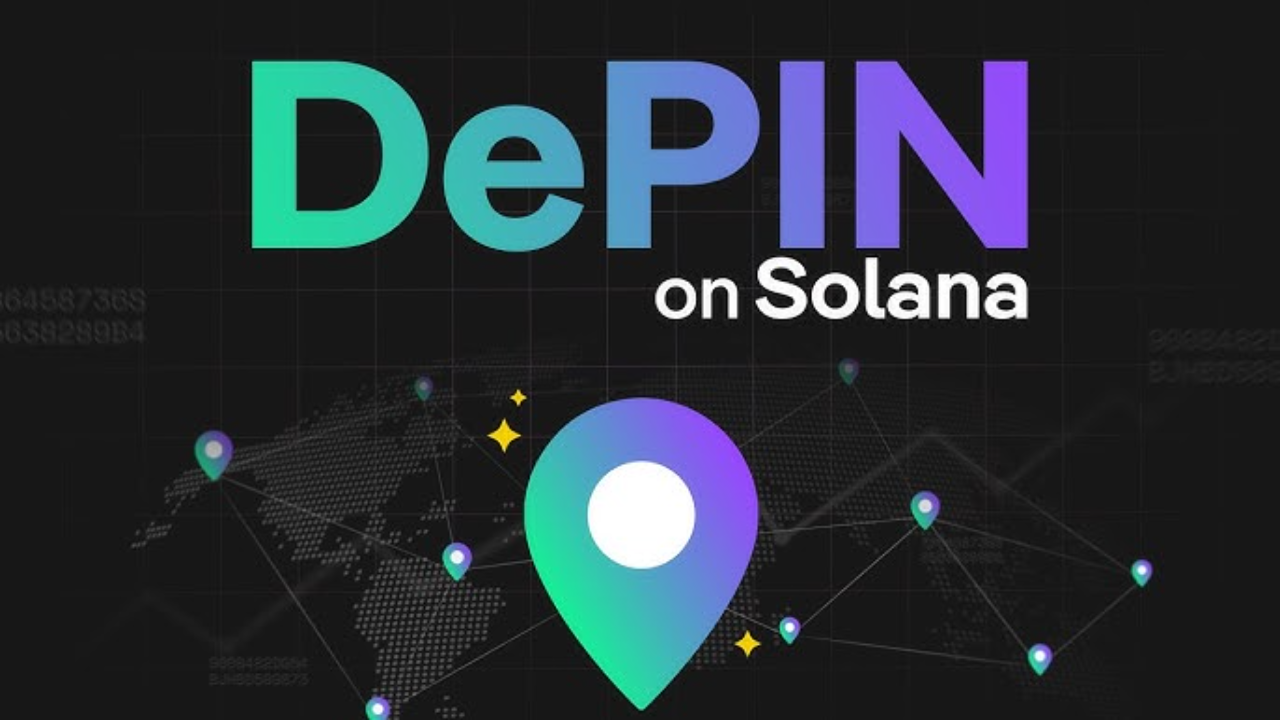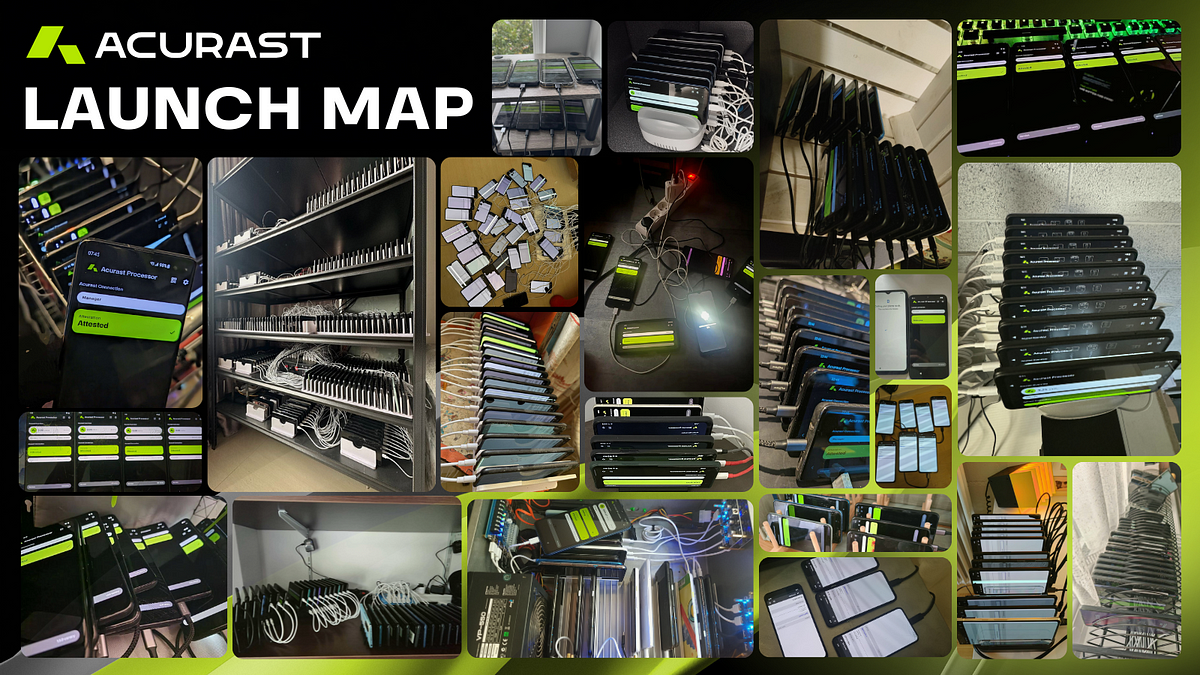Latest DePIN News

5 months ago
Web3Bay: A New Contender in the Decentralized E-commerce Space
In the rapidly evolving landscape of Web3, three projects are making headlines: Arweave, Helium, and the emerging contender Web3Bay. Arweave has recently experienced a remarkable 37.83% increase in its price, driven by its innovative decentralized storage solutions that allow users to store data permanently for a one-time fee. This surge in interest is further bolstered by Arweave's strategic acquisition of Odysee, which has introduced over 7 million new users to its platform, solidifying its position as a leader in the decentralized storage space.
Meanwhile, Helium is carving out its niche in the Internet of Things (IoT) sector with its decentralized wireless network, enabling operators to earn HNT tokens. Despite a slight decline in price, Helium's transition to the Solana blockchain in April 2023 has enhanced its scalability and transaction efficiency, leading to a 21% increase in September. This expansion, along with new Hotspot deployments, has fostered optimism for Helium's future, showcasing its potential for sustained growth in the IoT realm.
Web3Bay is positioning itself as a game-changer in the e-commerce sector by offering a decentralized marketplace that leverages blockchain technology for transparency and user ownership. The 3BAY token, which powers this ecosystem, has seen an astonishing 6430% increase from its presale price, indicating strong demand. With a community-driven governance model and diverse payment options, Web3Bay aims to bridge traditional and Web3 markets, making decentralized shopping accessible to a broader audience. As it prepares for its full launch, many industry experts view Web3Bay as a potential revolutionary force in the cryptocurrency market, with the 3BAY token being a hot topic among investors.

5 months ago
Anyone Network Introduces Delegated Staking to Enhance Tokenomics
The Anyone Network has announced a significant update to its tokenomics, specifically in the area of delegated staking. This new mechanism allows relay operators and token holders to stake an unlimited number of tokens, moving beyond the previous requirement of a 100-token lock. This change aims to enhance economic security for the network while providing substantial value accrual for token holders. By enabling delegated staking, token holders can either stake their tokens to their own relay family or delegate them to a trusted family, thus fostering a more robust staking environment.
A relay family consists of a group of relays managed by a single entity, all sharing the same EVM wallet address for rewards. This structure allows clients to consider the total tokens staked to a relay family when selecting circuits, promoting reputable operators with larger stakes. The flexibility of the staking mechanism, which includes no minimum lock period and a 14-day cooldown for unstaking, ensures that all tokens earn rewards at a consistent rate, contingent on the operational status of the relay family. This incentivizes holders to delegate their tokens wisely, enhancing the network's security against adversarial attacks.
In terms of incentives, all stakers will benefit from a base pool of tokens, with emissions distributed equally among staked tokens. As the Anyone Network transitions to a freemium model in 2025, users will have the option to access premium features for a subscription fee. The introduction of a gas-less Arweave distribution protocol further enhances the network's capabilities, allowing for scalable token distribution. Overall, this update not only strengthens the network's security but also aligns the interests of stakers and relay operators, paving the way for a more resilient and efficient blockchain ecosystem.

5 months ago
Decentralized Physical Infrastructure Networks: A New Paradigm in Blockchain
In the rapidly evolving landscape of blockchain technology, the concept of Decentralized Physical Infrastructure Networks (DePIN) is gaining significant traction. DePIN represents a transformative approach to network architecture, facilitating innovation across various sectors, including storage, computing, and artificial intelligence. By leveraging token incentive mechanisms, DePIN encourages users to contribute resources, thus enhancing network efficiency and lowering barriers to entry. Recent developments in this space have seen the emergence of projects like Filecoin, Helium, Shadow Token, and Aethir, which not only showcase innovative applications but also serve as compelling case studies for the practical implementation of decentralized networks.
DePIN encompasses a broad spectrum of services, categorized into physical basic networks and digital resource networks. This framework allows for the aggregation of resources, enabling providers with underutilized assets to rent them out, thereby maximizing efficiency. The decentralized nature of DePIN mitigates concerns associated with centralized entities, such as downtime and resource scarcity. As demand fluctuates, the network can dynamically scale its resources, ensuring optimal performance without the need for significant infrastructure changes. This flexibility is crucial in today's fast-paced digital environment, where resource demands can shift rapidly.
Among the notable projects in the DePIN ecosystem, Filecoin stands out as a leader in decentralized storage, while Helium has pioneered a decentralized wireless infrastructure. Shadow Token aims to disrupt traditional cloud storage models, and Aethir is emerging as a competitor in decentralized computing. Each of these projects not only illustrates the potential of DePIN but also highlights the shift towards a more democratized infrastructure model, where individuals collectively invest resources to build and maintain facilities. As the DePIN sector continues to grow, it promises to reshape the way we think about resource allocation and network management in the blockchain era.

5 months ago
Aleph.im Brings Dynamic NFTs to Life in Ubisoft’s Captain Laserhawk: The G.A.M.E
PARIS - [Ubisoft](https://www.ubisoft.com/en-us/) is taking its Web3 gaming vision to new heights with [Captain Laserhawk](https://edenonline.ubisoft.com/): The G.A.M.E., leveraging [Aleph.im](https://aleph.im/)’s decentralized infrastructure to introduce dynamic NFTs that evolve with player engagement. This marks Aleph.im’s third consecutive integration into Ubisoft’s web3 gaming titles.
### About Captain Laserhawk: the G.A.M.E.
Expanding the universe of Captain Laserhawk: A Blood Dragon Remix—Ubisoft’s Netflix series—Captain Laserhawk: The G.A.M.E. is a groundbreaking multiplayer adventure that empowers its community to influence the narrative.
Set in the dystopian world of Eden, a totalitarian regime replacing the United States, players assume the roles of citizens navigating challenges both in-game and across external digital channels. By increasing their citizen score, players gain influence over the evolving storyline, creating an unprecedented transmedia gaming experience.
### Ubisoft in-game NFTs powered by Aleph.im
Aleph.im is a pioneer in decentralized cloud computing, providing essential infrastructure for dynamic NFT metadata, verifiable randomness, and decentralized data storage. Aleph was amidst [Ubisoft’s Entrepreneur Labs](https://www.ubisoft.com/fr-fr/company/about-us/innovation/startup-programs/lab) cohorts, and the gaming giant has been leveraging and supporting Aleph’s decentralized solutions as a node operator. Dynamic NFTs were first introduced in joint collaboration, transforming static digital assets into interactive, playable features. Aleph’s [dynamic NFT technology](https://www.globenewswire.com/news-release/2021/12/21/2356156/0/en/Aleph-im-partners-with-Ubisoft-to-bring-playable-NFTs-to-AAA-games-for-the-first-time.html) was subsequently integrated into Ubisoft’s Web3 game Champions Tactics™ Grimoria Chronicles.
*“We’re proud of our long-standing partnership with a world-renowned game publisher, supporting their vision to push the boundaries of Web3 gaming,”* said Jonathan Schemoul, CEO of Aleph.im. *“By integrating dynamic NFT capabilities and Aleph’s serverless architecture, Ubisoft is redefining player interaction and ownership in the gaming industry at large.”*
Ubisoft's Captain Laserhawk: The G.A.M.E. introduced the Niji Warrior ID collection, a series of 10,000 NFTs minted on Arbitrum. These IDs function as dynamic governance tools, granting holders early and full access to the G.A.M.E.’s features, exclusive rewards, and the ability to influence the project’s future direction. As players advance, their Niji Warrior IDs evolve to showcase achievements and unlock unique customization options, perks, and governance privileges—blurring the lines between identity and gameplay. Aleph’s serverless architecture hosts the metadata for the NFTs, leveraging a distributed database to store ID card information and enabling seamless updates to reflect player progress dynamically.
*"Aleph.im has been an invaluable partner, allowing us to seamlessly manage dynamic NFT metadata while maintaining transparency and decentralization,”* said Didier Genevois, Executive Producer and Technical Director, Ubisoft.
This partnership cements Aleph.im as the cornerstone of Ubisoft’s Web3 gaming infrastructure, supporting titles like Champions Tactics. Ubisoft’s commitment to integrating decentralized cloud infrastructure ensures that its gaming ecosystems remain secure, fair, and innovative.

5 months ago
IoTeX Invited to Washington Blockchain Policy Summit, Trump Delivers Keynote at Gala Dinner
The Blockchain Association (BA) based in Washington D.C. has kicked off its 'Blockchain Policy Summit' with an opening address from the incoming U.S. President, Donald Trump, who expressed his commitment to stand alongside the industry and lead the development of the crypto sector. The first day of the summit includes closed-door discussions between dozens of member organizations and government officials to delve into the current blockchain industry trends and the future direction of U.S. policies. IoTeX, a member organization, has been invited to participate in the summit. Recently, the BA officially welcomed IoTeX, highlighting their expertise in the DePIN field, which is gaining increasing interest from policymakers and regulators in Washington D.C. IoTeX's substantial knowledge is expected to enhance BA's communication with the new government.
The Blockchain Association, representing the crypto industry in Washington D.C., consists of nearly 100 leading organizations and protocols. It aims to establish a reasonable and beneficial regulatory framework for blockchain technology. Over the past three years, the BA has actively engaged with numerous blockchain leaders at the policy level, participating in hundreds of discussions in the Senate and the House of Representatives. In 2023 alone, the BA was involved in 175 meetings with the Senate and House members. With the influence of the crypto-friendly political landscape under the newly elected President Trump, the Blockchain Policy Summit is highly anticipated, with notable attendees such as Senators Tim Scott, Bill Hagerty, Cynthia Lummis, and Representatives Patrick McHenry, French Hill, Ro Khanna, among others. Leading industry organizations with compliant and positive government relations, including a16z, Coinbase, Consensys, Grayscale, Messari, Ripple, Uniswap, Filecoin, and IoTeX, will participate as members at the summit.
IoTeX, as a member representing DePIN, is at the forefront of discussions. DePIN, a hot topic at the summit, has piqued the interest of Washington's policymakers and regulators. As a groundbreaking technology that connects real-world devices and infrastructure with the digital world, DePIN holds unique advantages in unlocking traditional industry value and energy. IoTeX, as a leader in the DePIN ecosystem, will collaborate with other industry leaders in the DePIN working group, such as Multicoin, Hedera, Filecoin, Helium, CESS, and Geodnet, to drive discussions and policymaking on integrating real-world applications with blockchain innovation. Larry, IoTeX's ecosystem lead, emphasized the crucial 100 days ahead for U.S. crypto legislation, highlighting the growing acceptance of DePIN among legislators. Raullen Chai, IoTeX's CEO and Co-founder, stressed the importance of collaboration with policymakers in establishing a thriving DePIN and crypto ecosystem. By joining the Blockchain Association, IoTeX aims to provide clear pathways for DePIN projects to launch and expand under regulatory guidance, ensuring accessibility for all users. Through long-term collaborations with professional organizations like the Industrial Internet Consortium (IIC) and IEEE, IoTeX is well-positioned to facilitate dialogues between DePIN and Washington's policymakers, marking a significant step in connecting the physical and digital worlds through decentralized technology.

5 months ago
Decentralized Physical Infrastructure Networks (DePin) Revolutionizing the Tech Sector
Decentralized Physical Infrastructure Networks (DePin) are reshaping the tech industry by facilitating decentralized projects in real-world infrastructure. Recent developments in the DePin sector include VanEck's $2.5 million investment in DAWN for decentralized wireless service, IoTeX's collaboration with the Blockchain Association for DePin political advocacy, Exabits securing $15 million in seed funding, and more.
Exabits, an AI GPU tokenization startup, received $15 million in seed funding. By tokenizing GPU compute resources, Exabits has reached a $150 million valuation and experienced a 300% quarterly revenue increase. GPUs play a vital role in the DePin AI ecosystem due to the high computing demands of AI research. While companies like Aethir focus on GPU-as-a-service partnerships, Exabits offers a unique perspective that shows promise in the sector.

5 months ago
Cryptocurrency Policy Summit in Washington D.C.
Today, on December 17th, the Cryptocurrency Policy Summit organized by the Washington Blockchain Association officially opened with a keynote address from the incoming U.S. President, Donald Trump. IoTeX, as a member, was invited to participate in this summit, joining industry leaders such as a16z, Coinbase, Consensys, Grayscale, Messari, Ripple, Uniswap, Filecoin, and dozens of U.S. congressional members to discuss and promote industry policy regulations. The Washington Blockchain Association stated that IoTeX's profound expertise in the DePIN field will enhance its communication with the government, giving it a significant voice. IoTeX's ecosystem lead, Larry, learned on-site that the next 100 days are crucial for cryptocurrency industry legislation in the U.S. Real, implementable applications like DePIN are gradually gaining recognition from lawmakers. DePIN has been prioritized alongside stablecoins, DeFi, and Staking as key legislative areas. During the summit, IoTeX will engage in in-depth discussions with members of the association's DePIN working group, including Multicoin, Hedera, Filecoin, Helium, CESS, and Geodnet, on policies and regulations related to the integration of the real world with blockchain innovation.

5 months ago
Solana Launches DePIN Compute to Meet AI's Growing Demand for Computing Power
Solana has launched Decentralized Physical Infrastructure Networks (DePIN) Compute, a groundbreaking decentralized system designed to address the surging demand for computing power driven by the rapid expansion of artificial intelligence (AI). Traditional computing systems are struggling to meet this demand, but DePIN offers a novel solution by leveraging underutilized resources, akin to how Airbnb allows homeowners to share their vacant properties. This innovative approach enables users to monetize their idle GPUs, making them available for developers, researchers, and startups in need of computational resources.
The functionality of DePIN Compute is straightforward: users can rent out their unused GPU power, creating a new income stream while optimizing resource utilization. This decentralized model is particularly beneficial for smaller developers and researchers who often find high-performance computing platforms financially prohibitive. By utilizing blockchain technology, DePIN Compute ensures a fast, cost-effective, and scalable method for sharing computing resources, ultimately democratizing access to advanced technology.
The significance of DePIN Compute is underscored by recent investments, notably VanEck's commitment of over $10 million to the project, reflecting strong confidence in its potential. VanEck's prior backing of Solana has already contributed to a positive market response, including the filing for the first SOL-based Exchange Traded Fund (ETF) in the United States. As AI continues to evolve, initiatives like DePIN Compute are set to revolutionize how computing power is accessed and utilized, fostering innovation and enabling a broader range of individuals and organizations to benefit from cutting-edge technology.

5 months ago
Acurast's Journey: Celebrating Progress and Future Milestones
In a recent message, Acurast's Co-Founder Alessandro De Carli celebrated a year of significant progress for the project, emphasizing the importance of community involvement. He expressed gratitude to various contributors, including Cellhasher for their hardware R&D, Passive Crypto Mining for their educational content, and Kevin for his valuable feedback. De Carli highlighted the importance of a collaborative community in achieving Acurast's vision of transforming computing by leveraging billions of smartphones to create a decentralized, secure, and confidential computing platform for developers.
The message also detailed Acurast's journey since the launch of the Acurast Lite, noting unprecedented growth in compute provision and activity on their incentivized testnet, which has become the most active chain in the Kusama ecosystem with over 120 million transactions. This success allowed the team to optimize the protocol significantly, achieving over 100x scalability. However, as more developers engaged with the protocol, it became clear that the pricing and reward system required a redesign to ensure long-term sustainability and community participation.
Looking ahead, Acurast has set a target for the Token Generation Event (TGE) in April 2025, following extensive discussions on the benefits of delaying the event for better system design. Upcoming milestones include the public release of iOSTokenomics, the launch of a new reward and pricing system, and the introduction of staking and economic security. Acurast aims to redefine the future of computing, particularly in the context of AI, and invites the community to join in this transformative journey.

5 months ago
GEODNET: Transforming Global Positioning with Decentralized RTK Network
GEODNET is revolutionizing global positioning services through its decentralized Real-Time Kinematics (RTK) network, which provides cost-effective and precise GPS and GNSS corrections. With centimeter-level accuracy, GEODNET caters to high-precision applications including autonomous vehicles, agricultural automation, and drone deliveries. Founded in 2021 by Mike Horton, who has over 25 years of experience in GNSS and RTK technology, GEODNET has rapidly expanded to over 10,000 RTK base stations globally, making it the largest RTK network in the world. This growth has resulted in an impressive $2 million in annualized revenue, reflecting a 455% increase from the previous year.
Utilizing a Decentralized Physical Infrastructure Network (DePIN) model, GEODNET significantly reduces the capital and operational costs associated with building a global RTK network. By distributing costs among infrastructure owners, the company has managed to cut expenses by 90% compared to traditional models. This innovative approach has allowed GEODNET to deploy its base stations quickly and efficiently. The network's partnerships with organizations such as the US Department of Agriculture demonstrate its practical applications and scalability, particularly in supporting tractor auto-steering technology.
GEODNET's ecosystem continues to grow through strategic collaborations with companies like Boson Motors, Wingbits, and Propeller, enhancing its RTK capabilities across various sectors. These partnerships not only extend GEODNET's reach but also improve the accuracy of applications ranging from precision agriculture to advanced flight tracking. As GEODNET aims to expand its node network to achieve full global coverage within the next few years, its focus on cost efficiency, scalability, and reliability positions it to meet the increasing demand for precise geolocation services in a rapidly evolving technological landscape.
Signup for latest DePIN news and updates